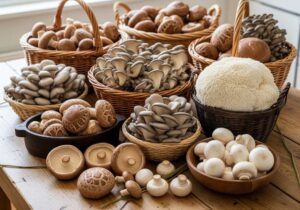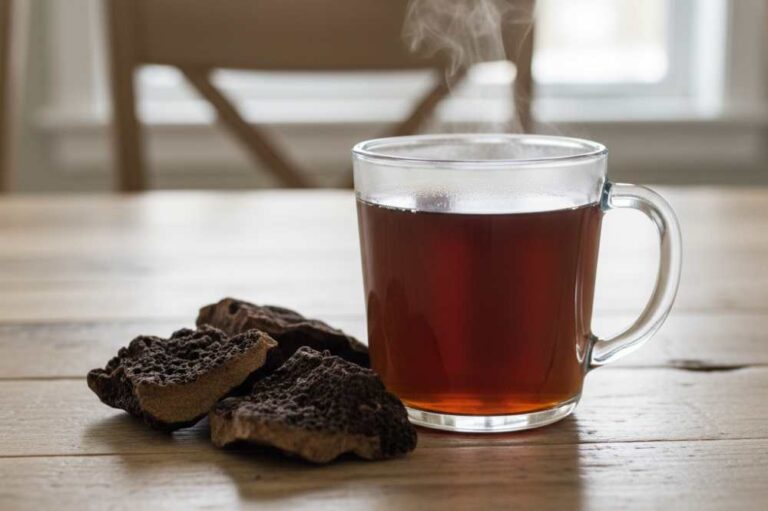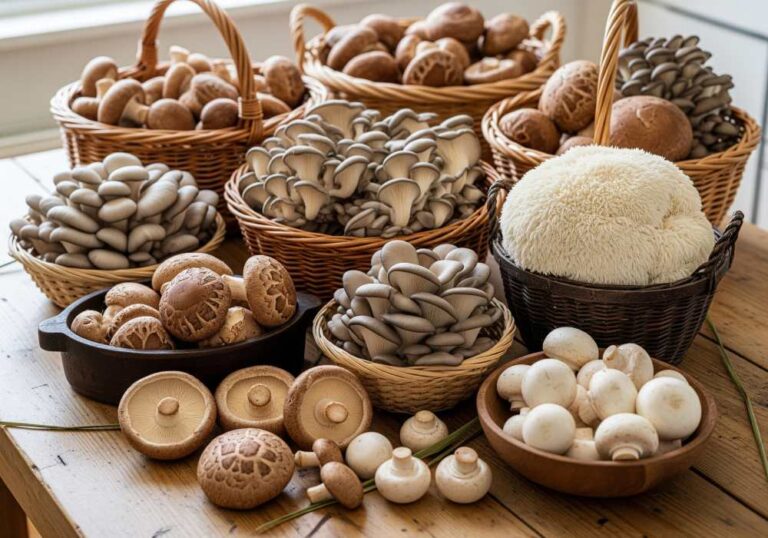Mushroom coffee has been praised for its potential health benefits and lower caffeine content than regular coffee. But as adults turn to this trendy drink, many parents wonder: can kids safely enjoy mushroom coffee too?
Today’s kids are surrounded by various drinks, from sugary sodas to caffeine-packed energy drinks. Parents who want healthier options might consider mushroom coffee, which boasts antioxidants and natural ingredients.
Yet, when it comes to children’s developing bodies and minds, is this popular beverage a good choice? Let’s find out.
Nutritional Profile of Mushroom Coffee
Mushroom coffee is a mix of traditional coffee and powdered medicinal mushrooms, offering a unique blend of nutrients.
Here’s what sets it apart from regular coffee:
Nutrients Found in Mushroom Coffee
- Vitamins and Minerals: Medicinal mushrooms like chaga and Lion’s Mane are rich in B vitamins, potassium, and zinc, which support overall health.
- Antioxidants: Mushrooms contain powerful antioxidants like polysaccharides and ergothioneine, which help fight oxidative stress in the body.
- Dietary Fiber: Some mushroom coffee blends include mushroom fiber, aiding digestion and promoting gut health.

Nutritional Benefits for Adults
- Cognitive Support: Mushrooms like Lion’s Mane are believed to enhance brain function and memory.
- Immune Boosting: Mushrooms such as Reishi and chaga can help strengthen the immune system due to their bioactive compounds.
- Stress Relief: Adaptogenic mushrooms like Reishi are known for their stress-reducing properties, which help the body adapt to stress.
For these unique benefits, they’re also being talked about in special diets, like the low FODMAP diet.
Is There Caffeine in Mushroom Coffee?
Yes, most mushroom coffee contains caffeine, but typically in smaller amounts than regular coffee. Mushroom coffee is made by blending traditional coffee beans with medicinal mushrooms, which naturally reduces the overall caffeine content.
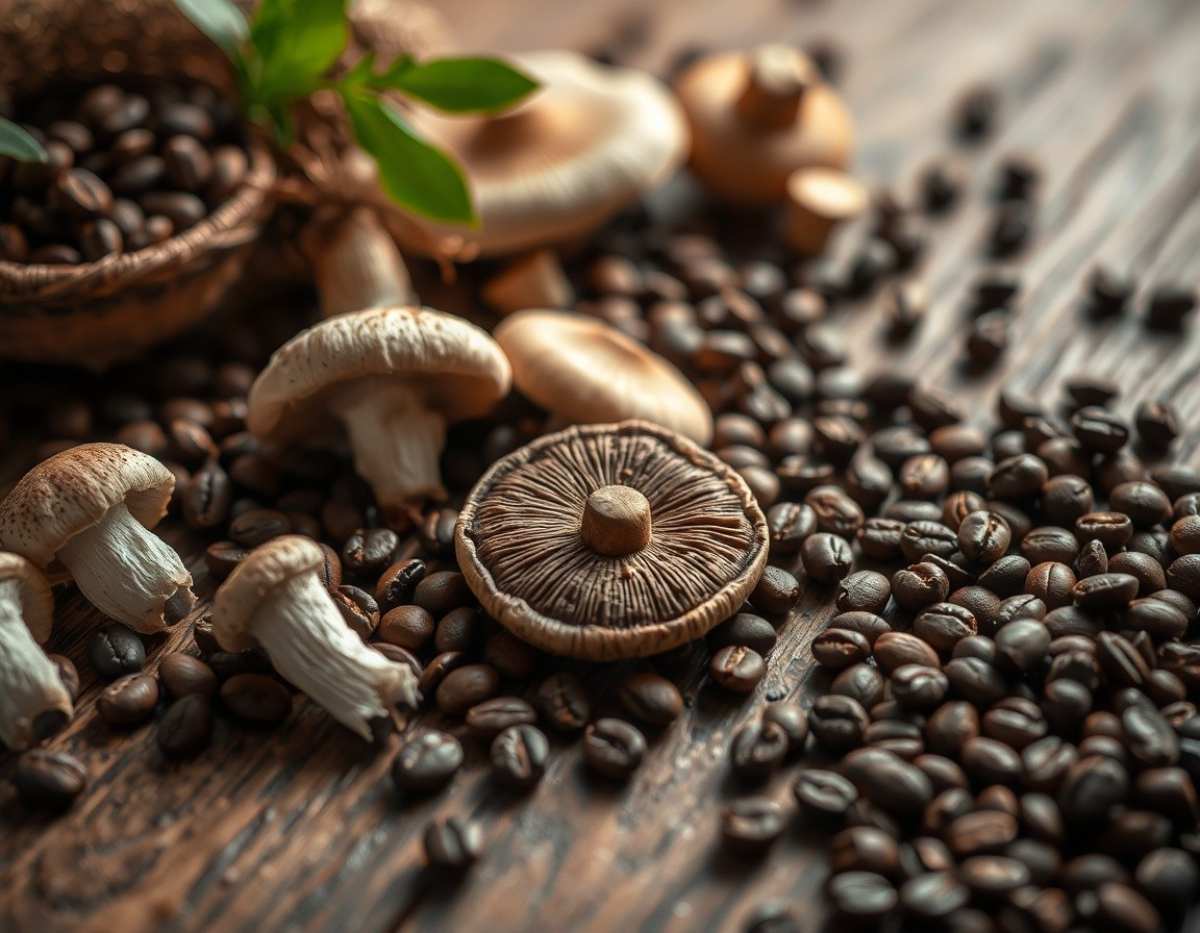
The exact amount of caffeine depends on the specific brand and the ratio of coffee to mushrooms in the mix.
For example, a regular cup of coffee may have around 95 milligrams of caffeine, while mushroom coffee often contains 50 to 70 milligrams.
Despite the lower caffeine content, it is still enough to cause noticeable effects, especially in children who are more sensitive to stimulants.
Some brands also offer caffeine-free mushroom coffee options but rely entirely on mushrooms without adding coffee beans. These can be a better alternative for those looking to avoid caffeine altogether.
Can Kids Safely Consume Mushrooms?
Yes, Many types of mushrooms are safe for children to eat, like those commonly found in meals such as button mushrooms or shiitake.
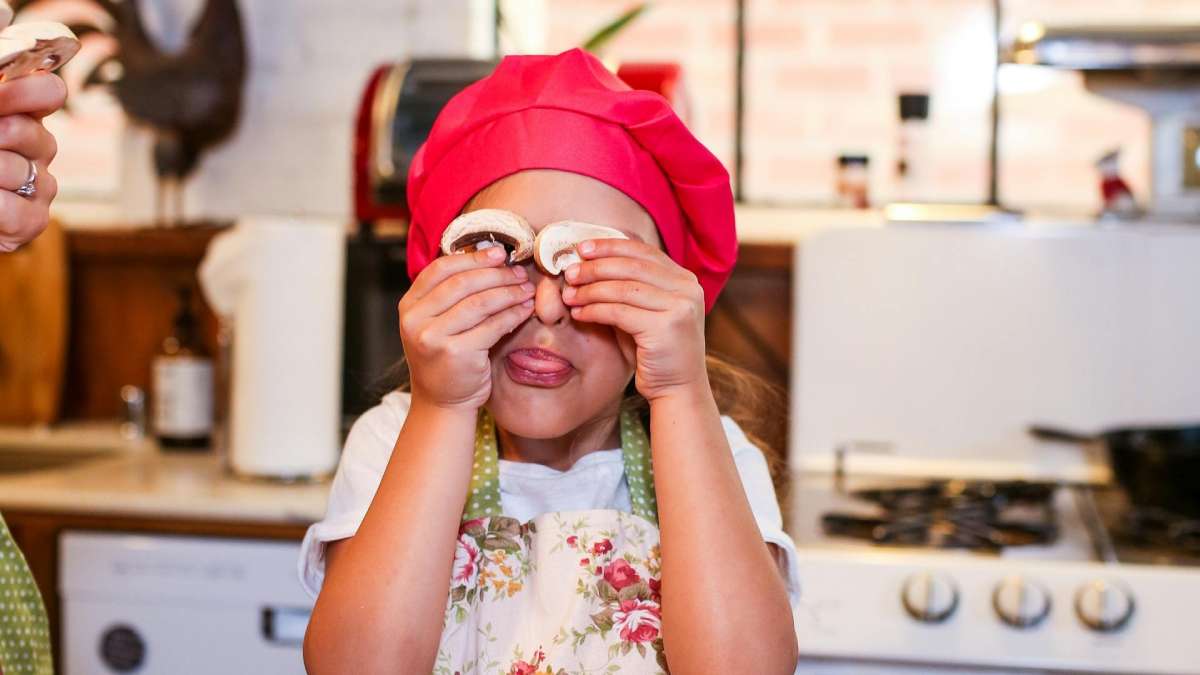
However, medicinal mushrooms like Chaga or Reishi, often used in mushroom coffee, have yet to be thoroughly studied in children. These mushrooms may have potent effects on the immune system and other body functions, which could be too strong for a child’s developing system.
Mushroom Coffee vs. Regular Coffee for Kids
Lower Caffeine: Mushroom coffee generally contains less caffeine than regular coffee, which may make it seem like a safer alternative for children.
Even small amounts of caffeine can affect kids more intensely than adults due to their smaller size and developing nervous systems.
Potential Benefits: Mushroom coffee might provide immune and cognitive benefits from its mushroom content. It is unlikely in normal coffee.
What Pediatricians Say About Mushroom Coffee?
Pediatricians generally advise against giving mushroom coffee to children, mainly due to the caffeine content and the lack of research on the effects of medicinal mushrooms in kids.

Caffeine can have a more substantial impact on children than adults, leading to issues like sleep disruption, anxiety, and increased heart rate. Since children’s bodies are still developing, even small amounts of caffeine can interfere with their growth, mood, and focus.
Without clear scientific studies on how these mushrooms affect children’s health, it’s best for parents to avoid giving such products to their kids.
Research on Medicinal Mushrooms and Children
Research on the effects of medicinal mushrooms on children is minimal.
Mushrooms like Chaga, Reishi, and Lion’s Mane have been studied for their benefits in adults—such as boosting immunity, enhancing cognitive function, and reducing inflammation—but there is little to no direct scientific evidence about how these mushrooms affect children.

There are concerns that the potent bioactive compounds in these mushrooms could have unintended side effects in children, whose bodies and immune systems are still developing.
The Role of Caffeine in Child Development
Caffeine, a natural stimulant in coffee, tea, chocolate, and many other beverages, can significantly affect child development. Adults may tolerate caffeine well, but children’s bodies process it differently, and even small amounts can influence their growth, behavior, and health.
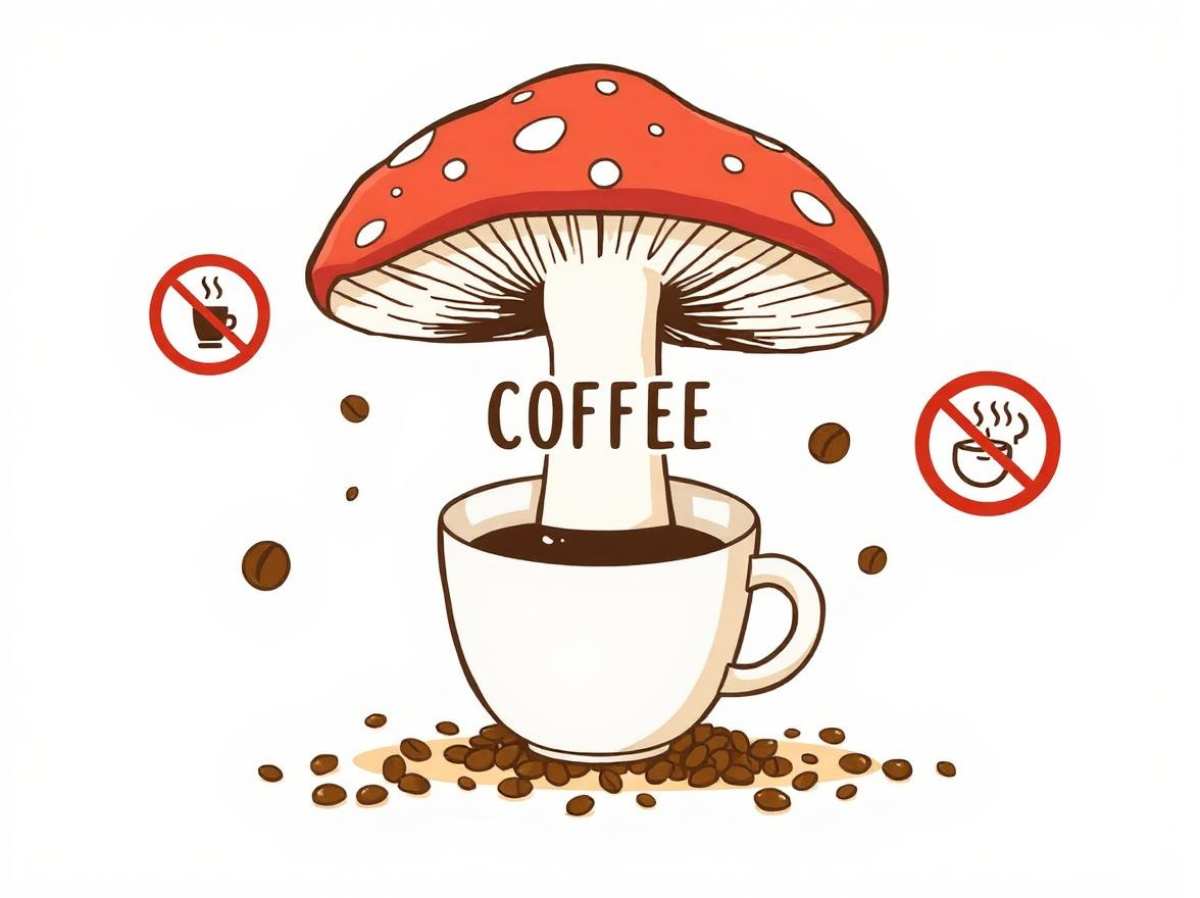
How Caffeine Affects Children’s Bodies
Children are more sensitive to caffeine because of their smaller body size and still-developing systems. Caffeine can overstimulate their nervous system, leading to symptoms such as:
- Increased heart rate
- Jitteriness and anxiety
- Difficulty concentrating
- Irritability and mood swings
Even small doses of caffeine can cause noticeable effects in children, making them more susceptible to these side effects than adults.
Impact on Sleep and Growth
Sleep is crucial for children’s development. It directly affects their physical growth, brain development, and emotional well-being.

Caffeine can interfere with sleep. It can be more challenging for kids to fall asleep or stay asleep, reducing the amount and quality of rest they get. Long-term sleep disruption due to caffeine can lead to delayed growth, mood disturbances, and reduced academic performance.
Cognitive Development and Learning
Caffeine may also affect children’s cognitive development. Adults often use caffeine to improve focus and alertness, but it can affect children differently.
Caffeine overstimulation can make it harder for children to concentrate in school, retain information, or complete tasks. This can negatively impact their learning and academic achievements, especially if caffeine is consumed regularly.
Long-Term Health Risks
Although occasional caffeine consumption may not have serious consequences, regular or excessive intake during childhood can pose long-term health risks.
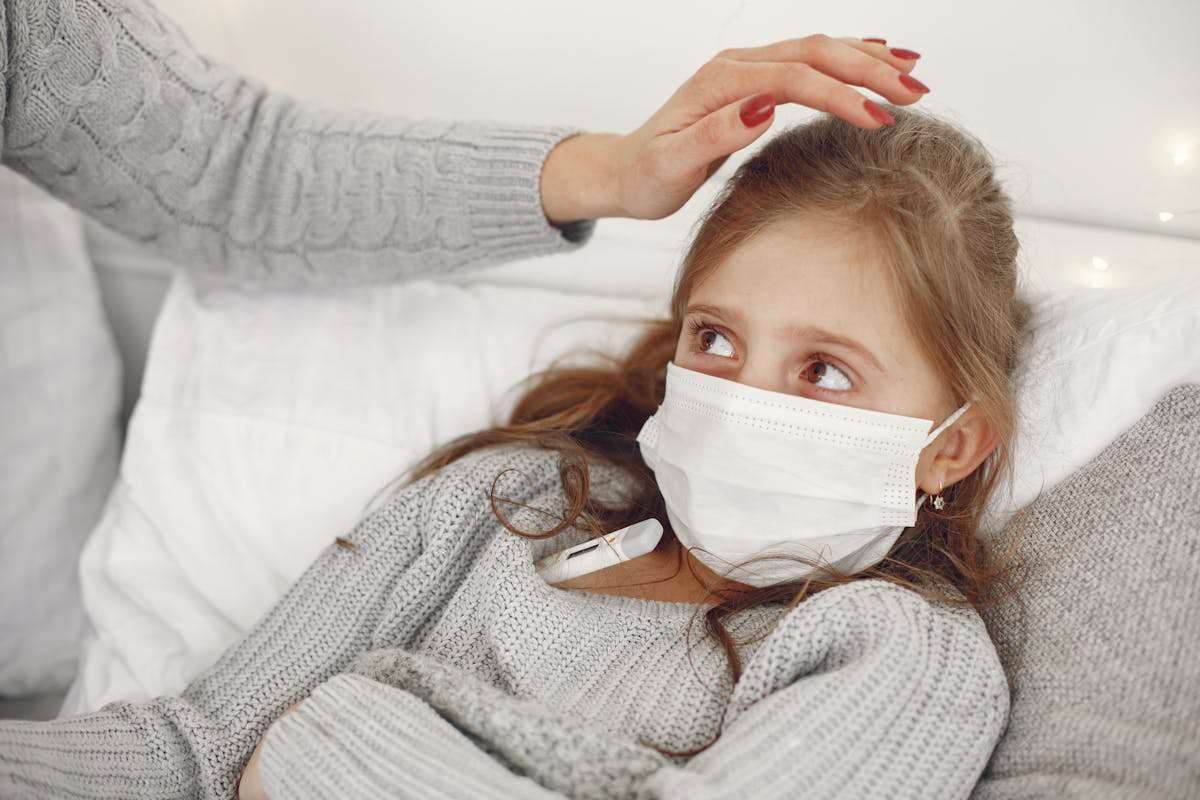
Over time, children may develop a dependency on caffeine. It leads to withdrawal symptoms like headaches, fatigue, and irritability.
Additionally, prolonged caffeine use could increase the risk of developing anxiety disorders, heart issues, or other health problems as they grow older.
Parents should be mindful of all sources of caffeine in their children’s diet, including coffee, sodas, energy drinks, and even certain snacks and desserts.
Interestingly, some of these health concerns overlap with those of breastfeeding moms.
Natural Coffee-Free Mushroom Supplements For Kids
Natural mushroom supplements can be a safer alternative for parents interested in the benefits of medicinal mushrooms without caffeine.
These supplements often come in the form of powders, capsules, or gummies. They contain the same medicinal mushrooms found in mushroom coffee, such as Lion’s Mane, Reishi, and Chaga.
These supplements are typically free from caffeine and other stimulants. They allow kids to potentially benefit from the immune-boosting and cognitive-enhancing properties of mushrooms without the added effects of coffee.
However, Parents should always consult a healthcare provider before introducing any mushroom supplements into their child’s diet.
Alternative Morning Beverages for Kids
Instead of coffee or mushroom coffee, there are several healthier and age-appropriate morning beverages for kids that provide energy and nutrition without the risks associated with caffeine.
These alternatives can help kids start their day with hydration and essential nutrients.
Warm Milk-Based Drinks
Warm milk is a comforting and nutritious choice for children. It provides calcium and vitamin D, both essential for growing bones.

Parents can add natural ingredients like a small amount of honey, cinnamon, or vanilla for added flavor and nutrients.
Plant-based milk alternatives, such as almond or oat milk, are also good options for kids with dairy sensitivities or preferences.
Fruit and Vegetable Smoothies
Smoothies made of fresh fruits and vegetables are another excellent choice. They provide a wide range of vitamins, minerals, and fiber. Blending fruits like bananas, berries, and mango with leafy greens like spinach can create a tasty, nutrient-rich drink.
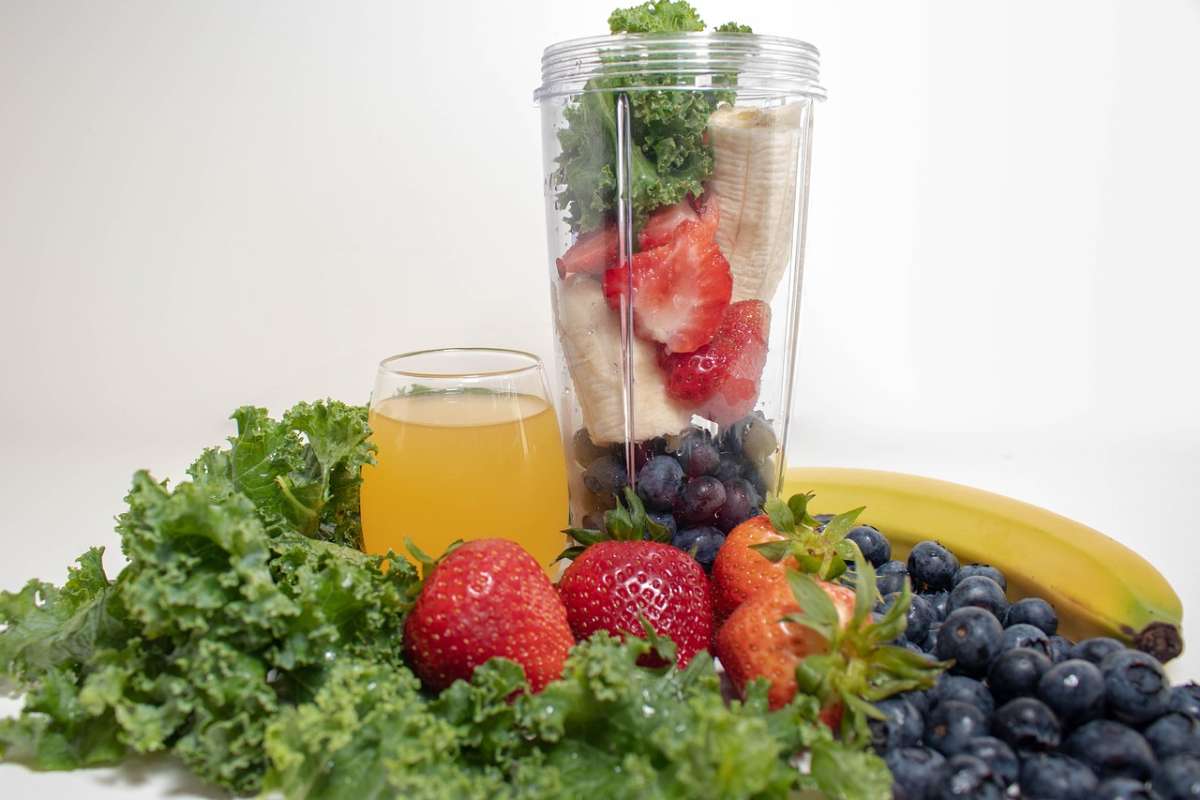
Adding yogurt or chia seeds can give the smoothie extra protein and a healthy fat boost.
Hot Chocolate and Other Non-Caffeinated Options
A warm cup of hot chocolate made from unsweetened cocoa and milk can be a fun and cozy morning drink for kids. Cocoa contains a small amount of naturally occurring caffeine, but it’s far less than what’s found in coffee or tea.
Herbal teas, such as chamomile or rooibos, are also safe, caffeine-free options that can provide hydration and a soothing start to the day.
These alternatives can offer a balanced and healthy start to the morning without the risks linked to caffeine or other stimulants.
Final Thoughts on Mushroom Coffee for Kids
Caffeine can disrupt sleep, affect mood, and interfere with concentration, all of which are critical for a child’s growth and cognitive development.
Parents looking for healthy alternatives should consider caffeine-free, nutrient-rich beverages more suitable for children’s needs.
In summary, while mushroom coffee might be a trendy and beneficial option for adults, there are other better fits for children.





